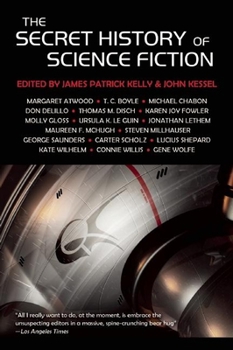The Secret History of Science Fiction
Select Format
Select Condition 
Book Overview
The secret is out. Exploring an alternate history of science fiction, this ingenious anthology showcases eighteen brilliant authors leading the way to a new literature of the future. These award-winning stories defy trends, cross genres, and prove that great fiction cannot be categorized. Two strangely detached astronauts orbit Earth while a third world war rages on. A primatologist's lover suspects her of obsession with one of her simian charges. The horrors of trench warfare dovetail with the theoretical workings of black holes. A dissolving marriage and bitter custody dispute are overshadowed by the arrival of time travelers. An astonishing invention that records the sense of touch is far too dangerous for Thomas Edison to reveal. The future is here. Read it.
Format:Paperback
Language:English
ISBN:1892391937
ISBN13:9781892391933
Release Date:October 2009
Publisher:Tachyon Publications
Length:380 Pages
Weight:1.05 lbs.
Dimensions:1.0" x 6.5" x 9.0"
Customer Reviews
1 rating
A Wonderful Collection
Published by Thriftbooks.com User , 14 years ago
Overall, I'm impressed by The Secret History of Science Fiction. The editors have done a good job of selecting stories that touch on the border between genre science fiction and "literary" fiction. Of the nineteen stories included, five were truly impressive works of brilliance, ten were well written and entertaining, two were confusing, and two were disappointing. I should add that the ten I describe as "entertaining" would appear more impressive in a more common collection. Their light is only dimmed slightly by the incredible creativity of the five standouts in the collection. The most impressive in the collection: "The Ones Who Walk Away From Omelas", by Ursula K. Le Guin, is a story set in a utopia with a dark secret. Le Guin draws us to question the price of our happiness. "Ladies and Gentlemen, This is Your Crisis", by Kate Wilhelm, presents the future of "reality" television and the role it and other media may (or has) come to play in shaping human interaction in our safely cushioned civilization. "The Nine Billion Names of God", by Carter Scholz, is a game of symbol and meaning played between a "writer" and an editor. "Interlocking Pieces", by Molly Gloss, is a beautiful story about personal disaster, understanding, and acceptance. "Buddha Nostril Bird", by John Kessel, is an adventure and a koan on identify and what it means to know. I should add that I've only just finished the collection so it is more than likely that my understanding of these stories will grow as they continue to unfold in my mind. Several stories in this collection are truly works of genius and I probably don't do them justice with the descriptions above. I hope I've said enough that you'll give the collection a chance. If you're looking for stories that take risks and follow creativity wherever it leads, you won't be disappointed. Two stories I found to be confusing: "Standing Room Only", by Karen Joy Fowler, seems to be a simple story centering on a background character to Lincoln's assassination. I don't see anything in it that would cause me to label it "science fiction". It's well written but I just don't understand its inclusion in the collection. If you can tell me what I've missed I would be very grateful. "93990", by George Saunders, is also well told but also left me suspecting I'd missed something. The author definitely succeeds at making me feel something and I think I understand the comment he's making about certain kinds of experiments. I'm just wondering if there's more to it, maybe something I'm missing. The rest: Most of the other stories in the collection are very well written but seem to lack that indescribable element that elevates the merely creative and clever to something more meaningful. For instance, "1016 to 1", by James Patrick Kelly, is well written and fun but reminds me too much of a childhood fantasy. Don't get me wrong, my interest did not waiver for a second as I read it. It's just that the ending left me w





